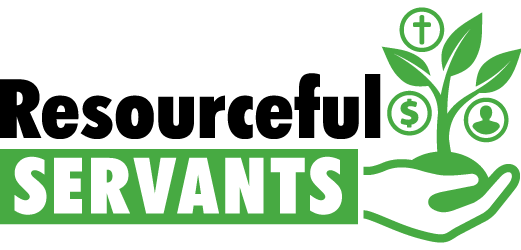Congregational Financial Assessment
One significant way a congregation can improve its financial wellness is to inspire donors and benefactors to grow its support. Donors, however, want to be able to trust that their congregation takes the responsibility of stewarding their gifts seriously, directing those gifts and resources to where they can make the biggest difference.
Through the Resourceful Servants Congregational Financial Assessment, your congregation can help grow its benefactors’ confidence by proactively engaging in a review of its financial systems relative to best practices and healthy behaviors. Carrying out these activities signals to donors that your congregation is worthy of donations and conveys that accountability, transparency, professionalism and impact are areas of great concern.

The Congregational Financial Assessment identifies 21 healthy financial practices from five key areas: accounting, finance, human resources, risk management and stewardship. Each healthy financial practice includes resources intended to help carry out that practice, along with an invitation to assess whether your congregation’s current proficiency in the practice is excellent, in need of improvement or nonexistent.
The goal of the program is for your congregation to deepen its financial knowledge and improve its financial behaviors, enabling you to best use the funding available to you.
ACCOUNTING
Recording and reporting the flow of money within a congregation instills confidence in its leaders and constituents that the financial resources needed for mission and vision are being generated and directed according to plan. Financial transparency also feeds a culture of trust that inspires people and motivates future gifts.
FINANCE
Financial and physical resources are tools for ministry that make everything else possible. Planning for and directing these resources appropriately provides a map for how a congregation will act on its mission. This is foundational to having an impact and making a difference in the name of Jesus.
HUMAN RESOURCES
Staff provide support for programmatic offerings and ministry within congregations. In many congregations, staff expenses represent the largest or second largest line items in a congregation’s budget, as well as a significant source of administrative complexity.
RISK MANAGEMENT
Like other organizations and individuals, congregations face a variety of risks that need to be understood and planned for to minimize their potential impact. Managing risk involves thoughtful discernment of these unwanted events as well as the insurance or other backup plans needed to address them when they do.
STEWARDSHIP
People’s understanding of their calling to make a difference through their congregation significantly affects their engagement, leadership and financial support. In addition to making meaningful ministry happen, it is vital that congregations continually teach, inspire, challenge, and affirm stewardship principles and generosity.
CONGREGATIONAL FINANCIAL ASSESSMENT TESTIMONIAL
ZOOM WEBINAR ABOUT THE CONGREGATIONAL FINANCIAL ASSESSMENT
HOW TO PARTICIPATE IN THE CONGREGATIONAL FINANCIAL ASSESSMENT
Who is the Congregational Financial Assessment intended for?
We hope your congregation can easily find a way to participate in the Congregational Financial Assessment program. In many congregations, operational responsibilities exceed the human resources needed to address them. Even in congregations with an abundance of people willing to serve, issues of congregational finance may still pose an extraordinary challenge.
This program is for congregational leaders interested in improving their congregation’s financial wellness and operational impact but unsure where to start. The Congregational Financial Assessment provides both a starting point and a road map to improved financial stability. Program participation may enable leaders in your congregation to step forward and serve with greater confidence and competence as they seek to master more advanced topics (e.g., narrative budgeting, online giving).
This program is also for congregational leaders interested in learning from and helping other ELCA congregations improve their financial wellness. Through the Resourceful Servants website, congregational leaders across the church will be able to answer one another’s questions and share resources they have developed or curated.
Share the infographic titled Improve Congregational Financial Wellness with leaders in your congregation to start or enhance a discussion about finances and how the Congregational Certificate Program could help your congregation.
How can our congregation use the Resourceful Servants website?
Explore the available resources — Using the “Congregations” area, your congregation can determine what you do and do not know about congregational finance and can explore resources (e.g., videos, articles, websites, textbooks) related to healthy financial practices. Links associated with each practice provide a deeper dive into the topic.
Track congregational behavior — Leaders in your congregation can track its progress on healthy financial practices. The site will indicate the congregation’s level of proficiency on each practice and give it an overall self-assessment score.
Communicate with peers — Built-in discussion tools enable your congregation to teach and learn from peers in other congregations and share its own feedback on resources it finds helpful or unhelpful.
How does our congregation use the assessment tool?
To begin the Congregational Financial Assessment and score your proficiency in each of the 21 healthy financial practices, log in to the behavior tracker. The tracker can be accessed from the Congregations menu by clicking on “Track Progress.”
Your congregation will earn points as you assess your use and competency for each behavior, with answers ranging from “We don’t do this practice” (0 points) to “We do this very well, with no need for development/improvement” (5 points).
To amplify learning across the ELCA, Resourceful Servants will watch for emerging trends related to:
- Congregational participation in the portal,
- Reported proficiencies in each healthy financial behavior, and
- Overall assessment scores across the range of practices.
This information will help us determine which resources will impact the greatest number of congregations.
Why use the Congregational Financial Assessment?
In addition to the internal motivation of improving your congregation’s financial health, participating in the Congregational Financial Assessment may benefit your congregation in the following ways:
- Growth in giving — Let’s face it: people are not inspired to give to causes that are “sinking ships” or have minimal impact. Donors want to sense that their gifts are being managed appropriately and are making a difference. Engaging with the Congregational Financial Assessment signals to supporters that your congregation takes good stewardship seriously, setting the table for higher levels of support and generosity.
- Impact on ministry — Financial wellness has impact beyond the congregational coffers. Participating in the Congregational Financial Assessment and implementing healthy financial practices may enable your congregation to focus more fully on faith formation inside and outside your walls.
- Knowledge transfer — By tracking your healthy financial practices, your congregation creates an excellent opportunity to transfer knowledge and practices from a retiring officer (e.g., a finance chair or treasurer) to an incoming officer. Record-keeping will raise new officers’ awareness of the congregation’s financial practices and prepare them to take further beneficial actions.
- Calling a rostered minister — Should your congregation enter the call process, rostered ministers seeking a call can see whether your congregation participates in the Congregational Financial Assessment. Participation could indicate to a potential rostered minister that your congregation values financial health.
- Borrowing money — Improved financial practices are of interest to donors as well as to any lending institution as it considers extending Congregations with sound financial practices are judged as less risky and thus are better positioned to be deemed creditworthy and deserving of low interest rates.
- Recognition at a synod assembly — If your congregation participates in the Congregational Financial Assessment, the congregation will be lifted up at your synod assembly. This will reinforce for the other congregations in your synod the importance of financial best practices and the work associated with them. It will also inform these congregations about the availability of resourcefulservants.org, the resources the website provides and the impact of any knowledge gained and behavior changed.
What is the period covered by the Congregational Financial Assessment?
Assessed practices are not intended to be “one and done”; rather, they must be repeated over and over. The self-assessment tracker retains a score for any given practice for up to 18 months before reverting to zero. The goal is to emphasize periodic reassessment while providing the time to research, implement and improve each financial best practice.
Do all ELCA congregations have access to the "Congregations" area of the Resourceful Servants website?
Yes. All ELCA congregations can access the “Congregations” area of resourcefulservants.org.
PROVIDE FEEDBACK TO RESOURCEFUL SERVANTS
Each of the best practices identified in the Congregational Financial Assessment has a discussion forum where you can share relevant resources and ideas that have been helpful for your congregation. You can also use the forum to ask questions of other users. The goal of the forum is to promote peer-to-peer learning.
If you have general comments or questions about the Congregational Financial Assessment, you can post them on our Feedback Forum page. We will take all feedback into account as we continue to enhance this site.
TRACK YOUR PROGRESS
Use our built-in tool to Track Progress for your congregation’s improvement embracing the 21 identified best practices. Start by indicating your congregation’s current proficiency on the behaviors associated with each of the five modules included on this website: Accounting, Finance, Human Resources, Risk Management and Stewardship. As your congregation implements new behaviors, log in to the tracker, find the practice, and indicate your improved proficiency.
To log in, you will need your five-digit congregational ID and the password provided to you to complete your 2019 or 2020 Annual Report. If you need this information, contact Resourceful Servants at resourceful.servants@elca.org.







